Operational Management, Risk, and Innovation in London Olympics
VerifiedAdded on 2020/01/15
|15
|5028
|112
Report
AI Summary
This report provides a comprehensive analysis of the London Olympics, focusing on event operational management, risk assessment, and innovation. It examines various risks, including terrorism, cyberattacks, financial constraints, and security concerns, offering detailed insights into their potential impact. The report also explores innovative strategies implemented during the games. It further provides recommendations for mitigating these risks and improving operational efficiency. The analysis covers the planning, organization, and execution of the event, highlighting the importance of effective management techniques such as scheduling, time management, and resource allocation. The report emphasizes the need for robust risk management strategies, including financial planning, security protocols, and resource management to ensure the success of future large-scale events.
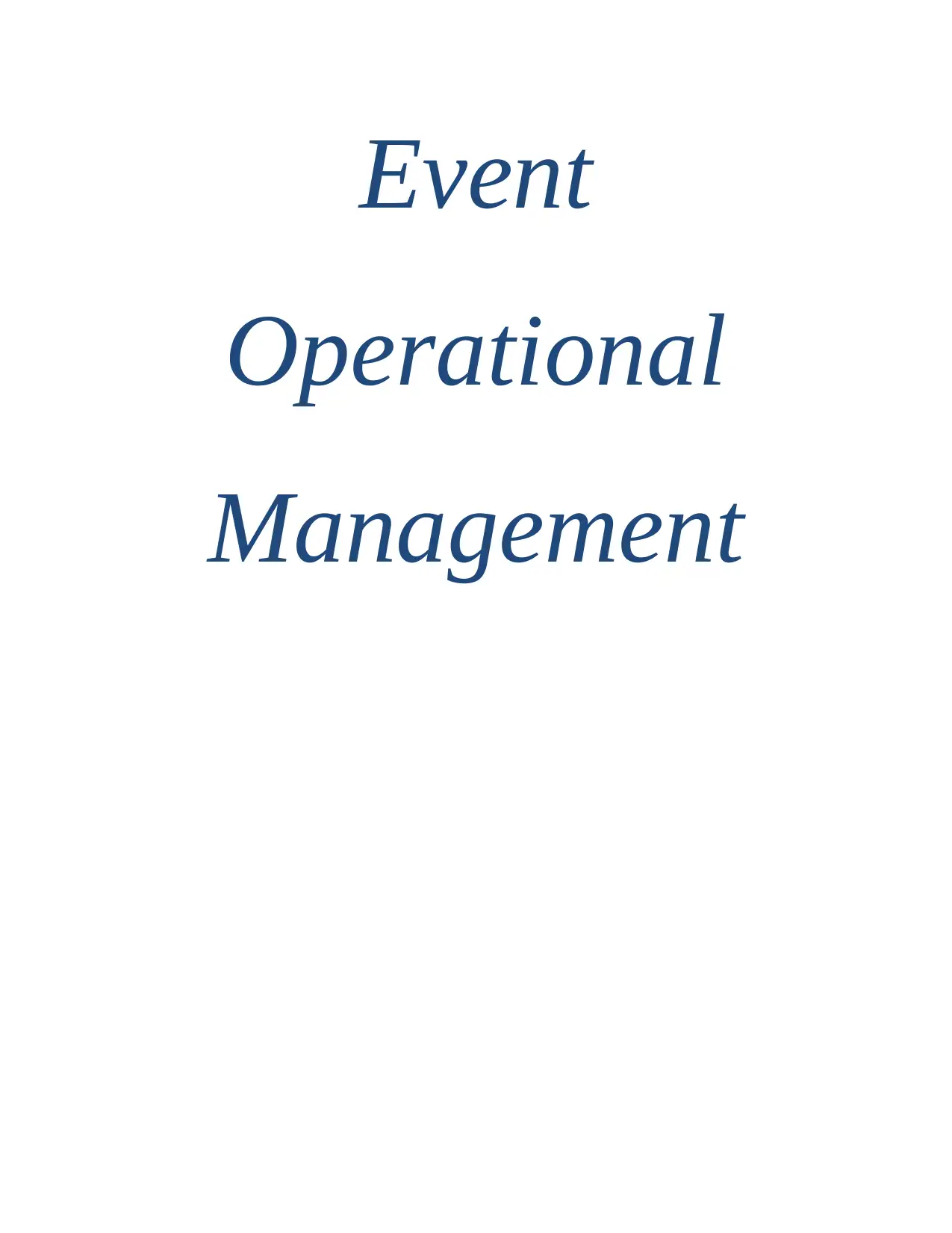
Event
Operational
Management
Operational
Management
Paraphrase This Document
Need a fresh take? Get an instant paraphrase of this document with our AI Paraphraser
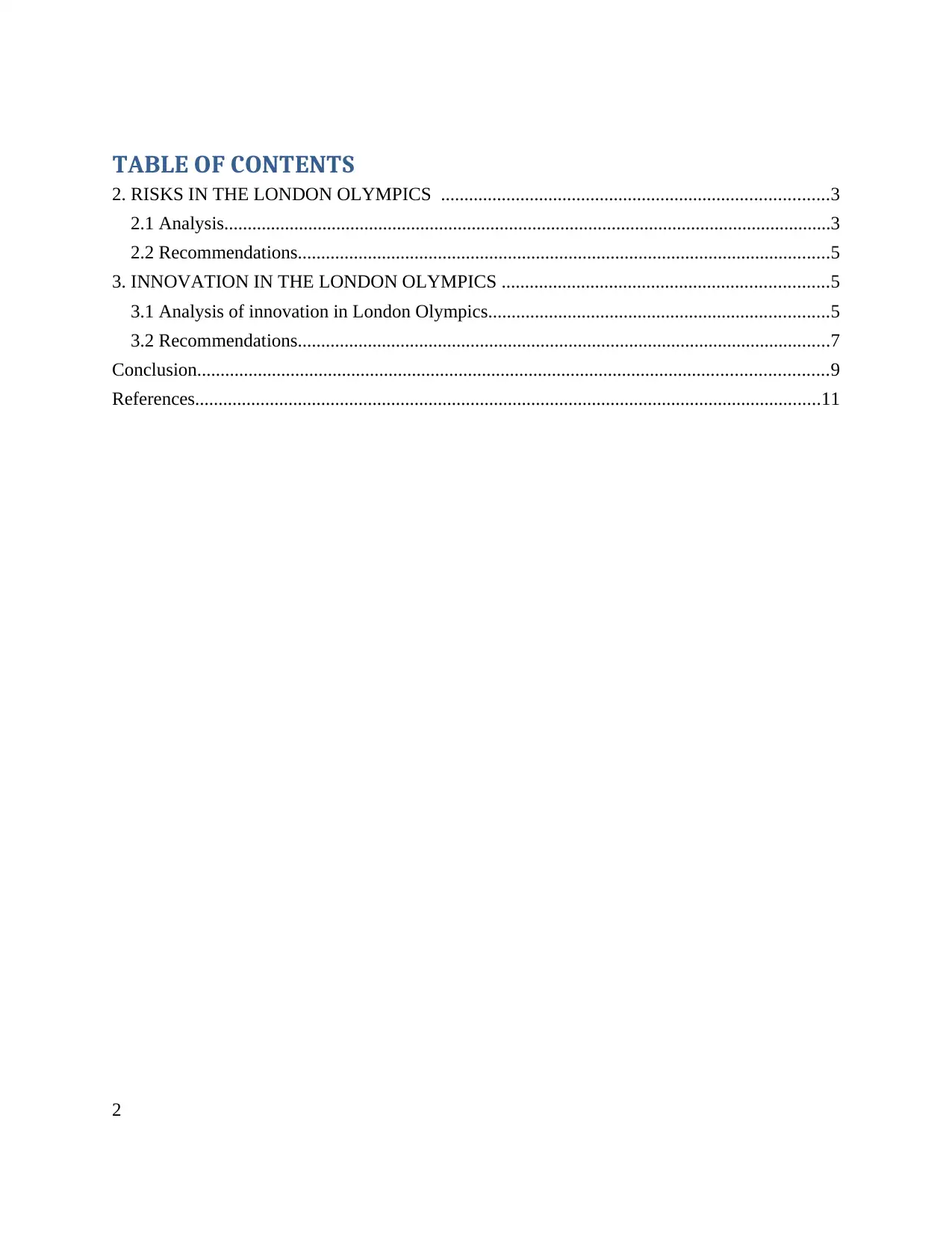
TABLE OF CONTENTS
2. RISKS IN THE LONDON OLYMPICS ...................................................................................3
2.1 Analysis..................................................................................................................................3
2.2 Recommendations..................................................................................................................5
3. INNOVATION IN THE LONDON OLYMPICS ......................................................................5
3.1 Analysis of innovation in London Olympics.........................................................................5
3.2 Recommendations..................................................................................................................7
Conclusion.......................................................................................................................................9
References......................................................................................................................................11
2
2. RISKS IN THE LONDON OLYMPICS ...................................................................................3
2.1 Analysis..................................................................................................................................3
2.2 Recommendations..................................................................................................................5
3. INNOVATION IN THE LONDON OLYMPICS ......................................................................5
3.1 Analysis of innovation in London Olympics.........................................................................5
3.2 Recommendations..................................................................................................................7
Conclusion.......................................................................................................................................9
References......................................................................................................................................11
2
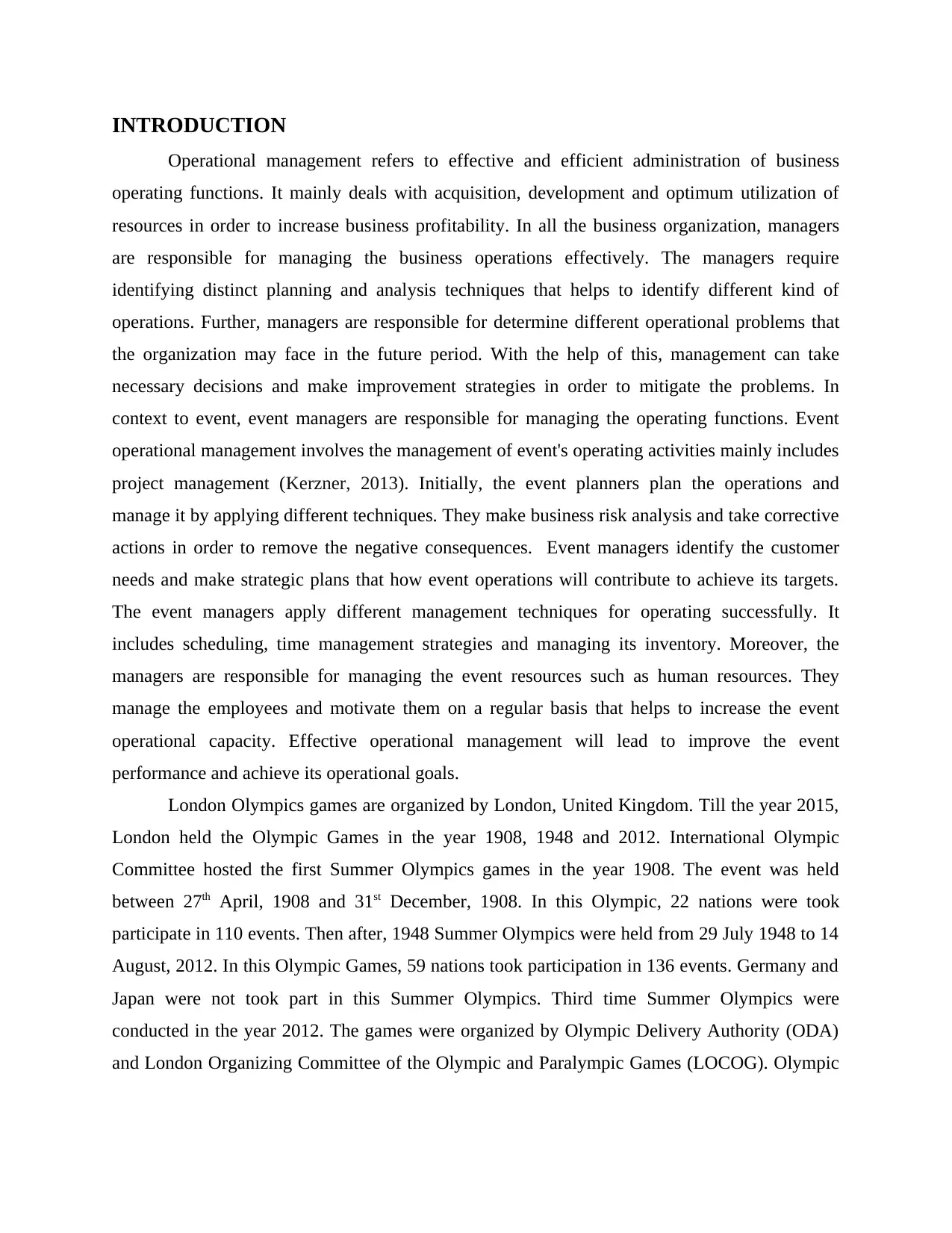
INTRODUCTION
Operational management refers to effective and efficient administration of business
operating functions. It mainly deals with acquisition, development and optimum utilization of
resources in order to increase business profitability. In all the business organization, managers
are responsible for managing the business operations effectively. The managers require
identifying distinct planning and analysis techniques that helps to identify different kind of
operations. Further, managers are responsible for determine different operational problems that
the organization may face in the future period. With the help of this, management can take
necessary decisions and make improvement strategies in order to mitigate the problems. In
context to event, event managers are responsible for managing the operating functions. Event
operational management involves the management of event's operating activities mainly includes
project management (Kerzner, 2013). Initially, the event planners plan the operations and
manage it by applying different techniques. They make business risk analysis and take corrective
actions in order to remove the negative consequences. Event managers identify the customer
needs and make strategic plans that how event operations will contribute to achieve its targets.
The event managers apply different management techniques for operating successfully. It
includes scheduling, time management strategies and managing its inventory. Moreover, the
managers are responsible for managing the event resources such as human resources. They
manage the employees and motivate them on a regular basis that helps to increase the event
operational capacity. Effective operational management will lead to improve the event
performance and achieve its operational goals.
London Olympics games are organized by London, United Kingdom. Till the year 2015,
London held the Olympic Games in the year 1908, 1948 and 2012. International Olympic
Committee hosted the first Summer Olympics games in the year 1908. The event was held
between 27th April, 1908 and 31st December, 1908. In this Olympic, 22 nations were took
participate in 110 events. Then after, 1948 Summer Olympics were held from 29 July 1948 to 14
August, 2012. In this Olympic Games, 59 nations took participation in 136 events. Germany and
Japan were not took part in this Summer Olympics. Third time Summer Olympics were
conducted in the year 2012. The games were organized by Olympic Delivery Authority (ODA)
and London Organizing Committee of the Olympic and Paralympic Games (LOCOG). Olympic
Operational management refers to effective and efficient administration of business
operating functions. It mainly deals with acquisition, development and optimum utilization of
resources in order to increase business profitability. In all the business organization, managers
are responsible for managing the business operations effectively. The managers require
identifying distinct planning and analysis techniques that helps to identify different kind of
operations. Further, managers are responsible for determine different operational problems that
the organization may face in the future period. With the help of this, management can take
necessary decisions and make improvement strategies in order to mitigate the problems. In
context to event, event managers are responsible for managing the operating functions. Event
operational management involves the management of event's operating activities mainly includes
project management (Kerzner, 2013). Initially, the event planners plan the operations and
manage it by applying different techniques. They make business risk analysis and take corrective
actions in order to remove the negative consequences. Event managers identify the customer
needs and make strategic plans that how event operations will contribute to achieve its targets.
The event managers apply different management techniques for operating successfully. It
includes scheduling, time management strategies and managing its inventory. Moreover, the
managers are responsible for managing the event resources such as human resources. They
manage the employees and motivate them on a regular basis that helps to increase the event
operational capacity. Effective operational management will lead to improve the event
performance and achieve its operational goals.
London Olympics games are organized by London, United Kingdom. Till the year 2015,
London held the Olympic Games in the year 1908, 1948 and 2012. International Olympic
Committee hosted the first Summer Olympics games in the year 1908. The event was held
between 27th April, 1908 and 31st December, 1908. In this Olympic, 22 nations were took
participate in 110 events. Then after, 1948 Summer Olympics were held from 29 July 1948 to 14
August, 2012. In this Olympic Games, 59 nations took participation in 136 events. Germany and
Japan were not took part in this Summer Olympics. Third time Summer Olympics were
conducted in the year 2012. The games were organized by Olympic Delivery Authority (ODA)
and London Organizing Committee of the Olympic and Paralympic Games (LOCOG). Olympic
⊘ This is a preview!⊘
Do you want full access?
Subscribe today to unlock all pages.

Trusted by 1+ million students worldwide
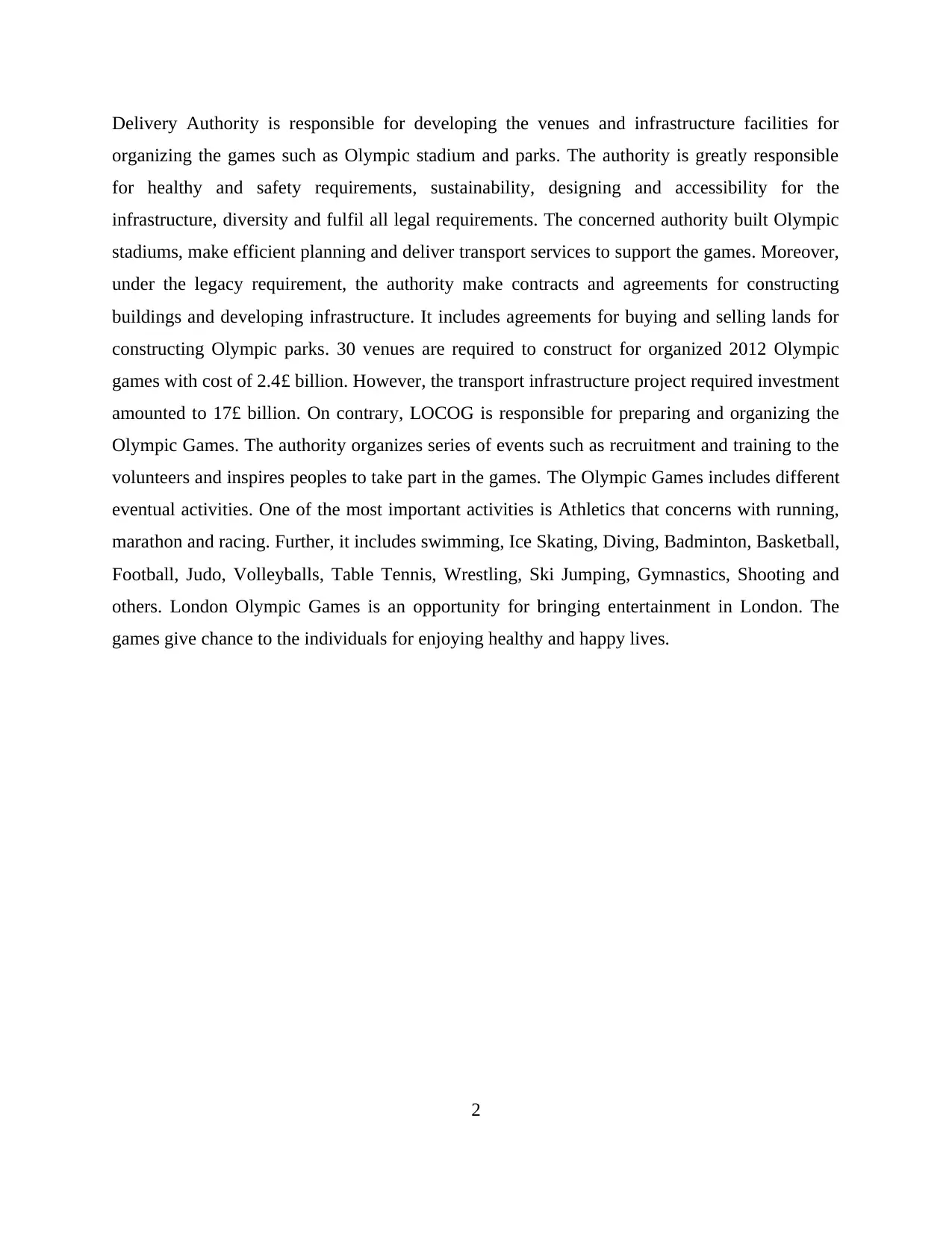
Delivery Authority is responsible for developing the venues and infrastructure facilities for
organizing the games such as Olympic stadium and parks. The authority is greatly responsible
for healthy and safety requirements, sustainability, designing and accessibility for the
infrastructure, diversity and fulfil all legal requirements. The concerned authority built Olympic
stadiums, make efficient planning and deliver transport services to support the games. Moreover,
under the legacy requirement, the authority make contracts and agreements for constructing
buildings and developing infrastructure. It includes agreements for buying and selling lands for
constructing Olympic parks. 30 venues are required to construct for organized 2012 Olympic
games with cost of 2.4£ billion. However, the transport infrastructure project required investment
amounted to 17£ billion. On contrary, LOCOG is responsible for preparing and organizing the
Olympic Games. The authority organizes series of events such as recruitment and training to the
volunteers and inspires peoples to take part in the games. The Olympic Games includes different
eventual activities. One of the most important activities is Athletics that concerns with running,
marathon and racing. Further, it includes swimming, Ice Skating, Diving, Badminton, Basketball,
Football, Judo, Volleyballs, Table Tennis, Wrestling, Ski Jumping, Gymnastics, Shooting and
others. London Olympic Games is an opportunity for bringing entertainment in London. The
games give chance to the individuals for enjoying healthy and happy lives.
2
organizing the games such as Olympic stadium and parks. The authority is greatly responsible
for healthy and safety requirements, sustainability, designing and accessibility for the
infrastructure, diversity and fulfil all legal requirements. The concerned authority built Olympic
stadiums, make efficient planning and deliver transport services to support the games. Moreover,
under the legacy requirement, the authority make contracts and agreements for constructing
buildings and developing infrastructure. It includes agreements for buying and selling lands for
constructing Olympic parks. 30 venues are required to construct for organized 2012 Olympic
games with cost of 2.4£ billion. However, the transport infrastructure project required investment
amounted to 17£ billion. On contrary, LOCOG is responsible for preparing and organizing the
Olympic Games. The authority organizes series of events such as recruitment and training to the
volunteers and inspires peoples to take part in the games. The Olympic Games includes different
eventual activities. One of the most important activities is Athletics that concerns with running,
marathon and racing. Further, it includes swimming, Ice Skating, Diving, Badminton, Basketball,
Football, Judo, Volleyballs, Table Tennis, Wrestling, Ski Jumping, Gymnastics, Shooting and
others. London Olympic Games is an opportunity for bringing entertainment in London. The
games give chance to the individuals for enjoying healthy and happy lives.
2
Paraphrase This Document
Need a fresh take? Get an instant paraphrase of this document with our AI Paraphraser
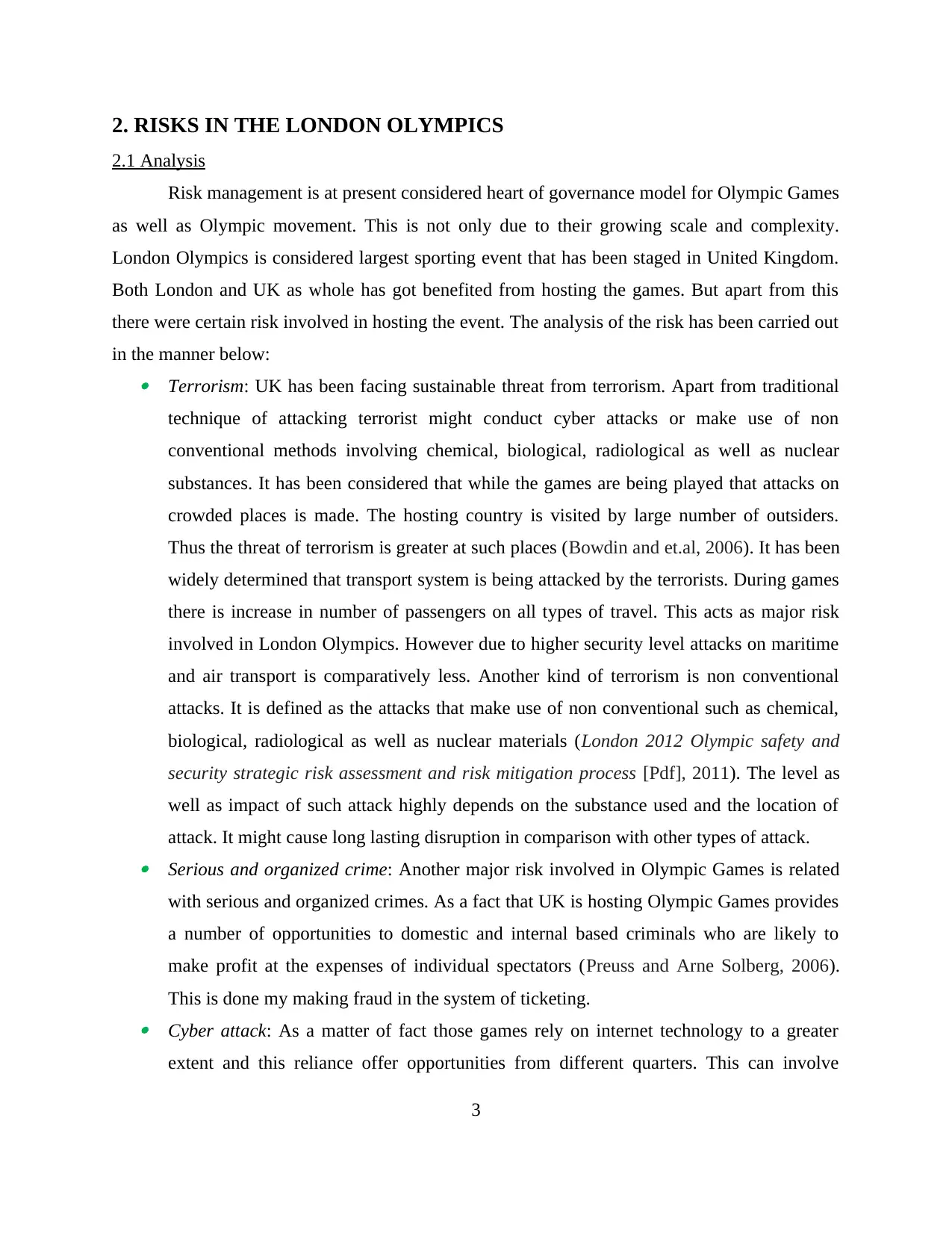
2. RISKS IN THE LONDON OLYMPICS
2.1 Analysis
Risk management is at present considered heart of governance model for Olympic Games
as well as Olympic movement. This is not only due to their growing scale and complexity.
London Olympics is considered largest sporting event that has been staged in United Kingdom.
Both London and UK as whole has got benefited from hosting the games. But apart from this
there were certain risk involved in hosting the event. The analysis of the risk has been carried out
in the manner below: Terrorism: UK has been facing sustainable threat from terrorism. Apart from traditional
technique of attacking terrorist might conduct cyber attacks or make use of non
conventional methods involving chemical, biological, radiological as well as nuclear
substances. It has been considered that while the games are being played that attacks on
crowded places is made. The hosting country is visited by large number of outsiders.
Thus the threat of terrorism is greater at such places (Bowdin and et.al, 2006). It has been
widely determined that transport system is being attacked by the terrorists. During games
there is increase in number of passengers on all types of travel. This acts as major risk
involved in London Olympics. However due to higher security level attacks on maritime
and air transport is comparatively less. Another kind of terrorism is non conventional
attacks. It is defined as the attacks that make use of non conventional such as chemical,
biological, radiological as well as nuclear materials (London 2012 Olympic safety and
security strategic risk assessment and risk mitigation process [Pdf], 2011). The level as
well as impact of such attack highly depends on the substance used and the location of
attack. It might cause long lasting disruption in comparison with other types of attack. Serious and organized crime: Another major risk involved in Olympic Games is related
with serious and organized crimes. As a fact that UK is hosting Olympic Games provides
a number of opportunities to domestic and internal based criminals who are likely to
make profit at the expenses of individual spectators (Preuss and Arne Solberg, 2006).
This is done my making fraud in the system of ticketing. Cyber attack: As a matter of fact those games rely on internet technology to a greater
extent and this reliance offer opportunities from different quarters. This can involve
3
2.1 Analysis
Risk management is at present considered heart of governance model for Olympic Games
as well as Olympic movement. This is not only due to their growing scale and complexity.
London Olympics is considered largest sporting event that has been staged in United Kingdom.
Both London and UK as whole has got benefited from hosting the games. But apart from this
there were certain risk involved in hosting the event. The analysis of the risk has been carried out
in the manner below: Terrorism: UK has been facing sustainable threat from terrorism. Apart from traditional
technique of attacking terrorist might conduct cyber attacks or make use of non
conventional methods involving chemical, biological, radiological as well as nuclear
substances. It has been considered that while the games are being played that attacks on
crowded places is made. The hosting country is visited by large number of outsiders.
Thus the threat of terrorism is greater at such places (Bowdin and et.al, 2006). It has been
widely determined that transport system is being attacked by the terrorists. During games
there is increase in number of passengers on all types of travel. This acts as major risk
involved in London Olympics. However due to higher security level attacks on maritime
and air transport is comparatively less. Another kind of terrorism is non conventional
attacks. It is defined as the attacks that make use of non conventional such as chemical,
biological, radiological as well as nuclear materials (London 2012 Olympic safety and
security strategic risk assessment and risk mitigation process [Pdf], 2011). The level as
well as impact of such attack highly depends on the substance used and the location of
attack. It might cause long lasting disruption in comparison with other types of attack. Serious and organized crime: Another major risk involved in Olympic Games is related
with serious and organized crimes. As a fact that UK is hosting Olympic Games provides
a number of opportunities to domestic and internal based criminals who are likely to
make profit at the expenses of individual spectators (Preuss and Arne Solberg, 2006).
This is done my making fraud in the system of ticketing. Cyber attack: As a matter of fact those games rely on internet technology to a greater
extent and this reliance offer opportunities from different quarters. This can involve
3
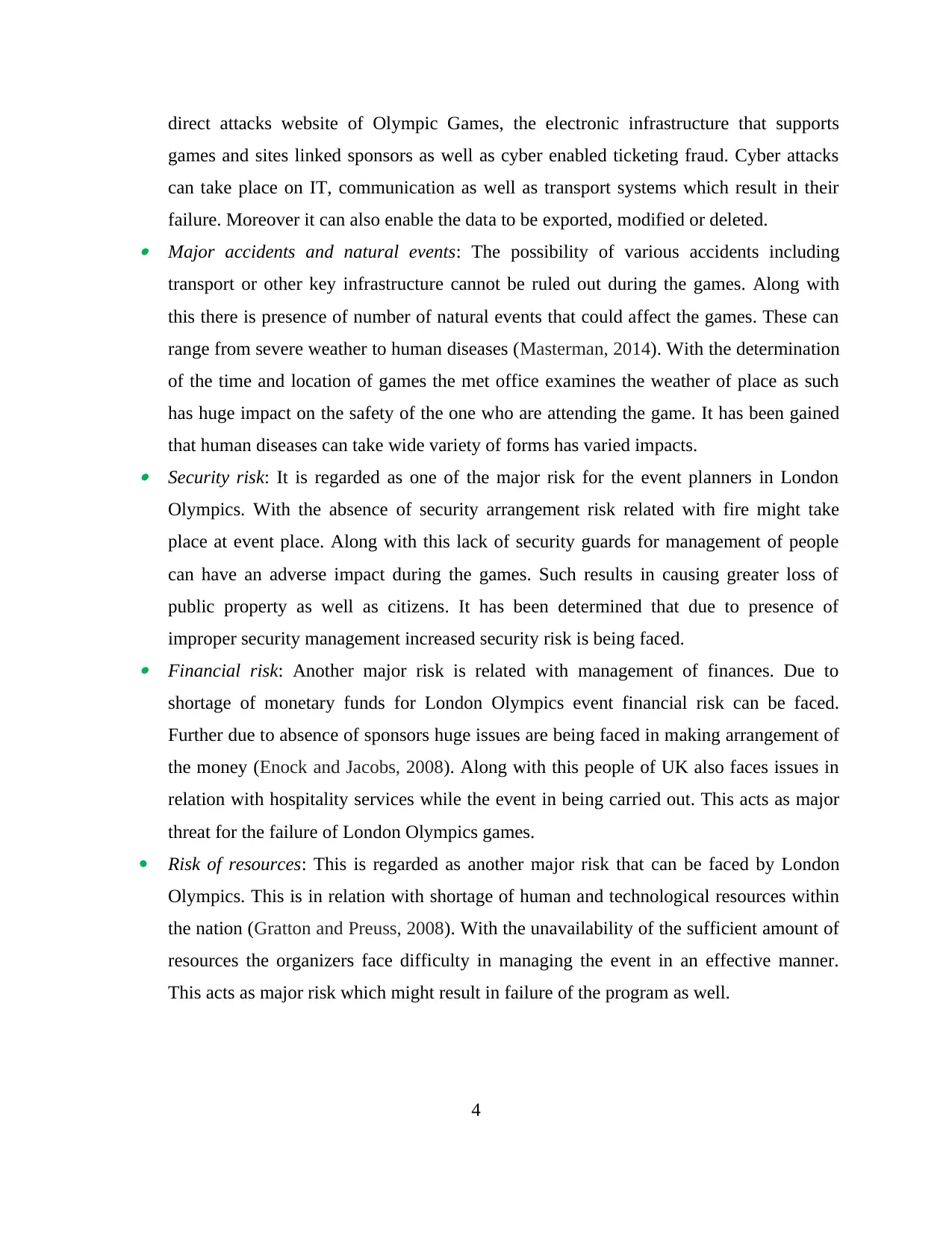
direct attacks website of Olympic Games, the electronic infrastructure that supports
games and sites linked sponsors as well as cyber enabled ticketing fraud. Cyber attacks
can take place on IT, communication as well as transport systems which result in their
failure. Moreover it can also enable the data to be exported, modified or deleted. Major accidents and natural events: The possibility of various accidents including
transport or other key infrastructure cannot be ruled out during the games. Along with
this there is presence of number of natural events that could affect the games. These can
range from severe weather to human diseases (Masterman, 2014). With the determination
of the time and location of games the met office examines the weather of place as such
has huge impact on the safety of the one who are attending the game. It has been gained
that human diseases can take wide variety of forms has varied impacts. Security risk: It is regarded as one of the major risk for the event planners in London
Olympics. With the absence of security arrangement risk related with fire might take
place at event place. Along with this lack of security guards for management of people
can have an adverse impact during the games. Such results in causing greater loss of
public property as well as citizens. It has been determined that due to presence of
improper security management increased security risk is being faced. Financial risk: Another major risk is related with management of finances. Due to
shortage of monetary funds for London Olympics event financial risk can be faced.
Further due to absence of sponsors huge issues are being faced in making arrangement of
the money (Enock and Jacobs, 2008). Along with this people of UK also faces issues in
relation with hospitality services while the event in being carried out. This acts as major
threat for the failure of London Olympics games.
Risk of resources: This is regarded as another major risk that can be faced by London
Olympics. This is in relation with shortage of human and technological resources within
the nation (Gratton and Preuss, 2008). With the unavailability of the sufficient amount of
resources the organizers face difficulty in managing the event in an effective manner.
This acts as major risk which might result in failure of the program as well.
4
games and sites linked sponsors as well as cyber enabled ticketing fraud. Cyber attacks
can take place on IT, communication as well as transport systems which result in their
failure. Moreover it can also enable the data to be exported, modified or deleted. Major accidents and natural events: The possibility of various accidents including
transport or other key infrastructure cannot be ruled out during the games. Along with
this there is presence of number of natural events that could affect the games. These can
range from severe weather to human diseases (Masterman, 2014). With the determination
of the time and location of games the met office examines the weather of place as such
has huge impact on the safety of the one who are attending the game. It has been gained
that human diseases can take wide variety of forms has varied impacts. Security risk: It is regarded as one of the major risk for the event planners in London
Olympics. With the absence of security arrangement risk related with fire might take
place at event place. Along with this lack of security guards for management of people
can have an adverse impact during the games. Such results in causing greater loss of
public property as well as citizens. It has been determined that due to presence of
improper security management increased security risk is being faced. Financial risk: Another major risk is related with management of finances. Due to
shortage of monetary funds for London Olympics event financial risk can be faced.
Further due to absence of sponsors huge issues are being faced in making arrangement of
the money (Enock and Jacobs, 2008). Along with this people of UK also faces issues in
relation with hospitality services while the event in being carried out. This acts as major
threat for the failure of London Olympics games.
Risk of resources: This is regarded as another major risk that can be faced by London
Olympics. This is in relation with shortage of human and technological resources within
the nation (Gratton and Preuss, 2008). With the unavailability of the sufficient amount of
resources the organizers face difficulty in managing the event in an effective manner.
This acts as major risk which might result in failure of the program as well.
4
⊘ This is a preview!⊘
Do you want full access?
Subscribe today to unlock all pages.

Trusted by 1+ million students worldwide
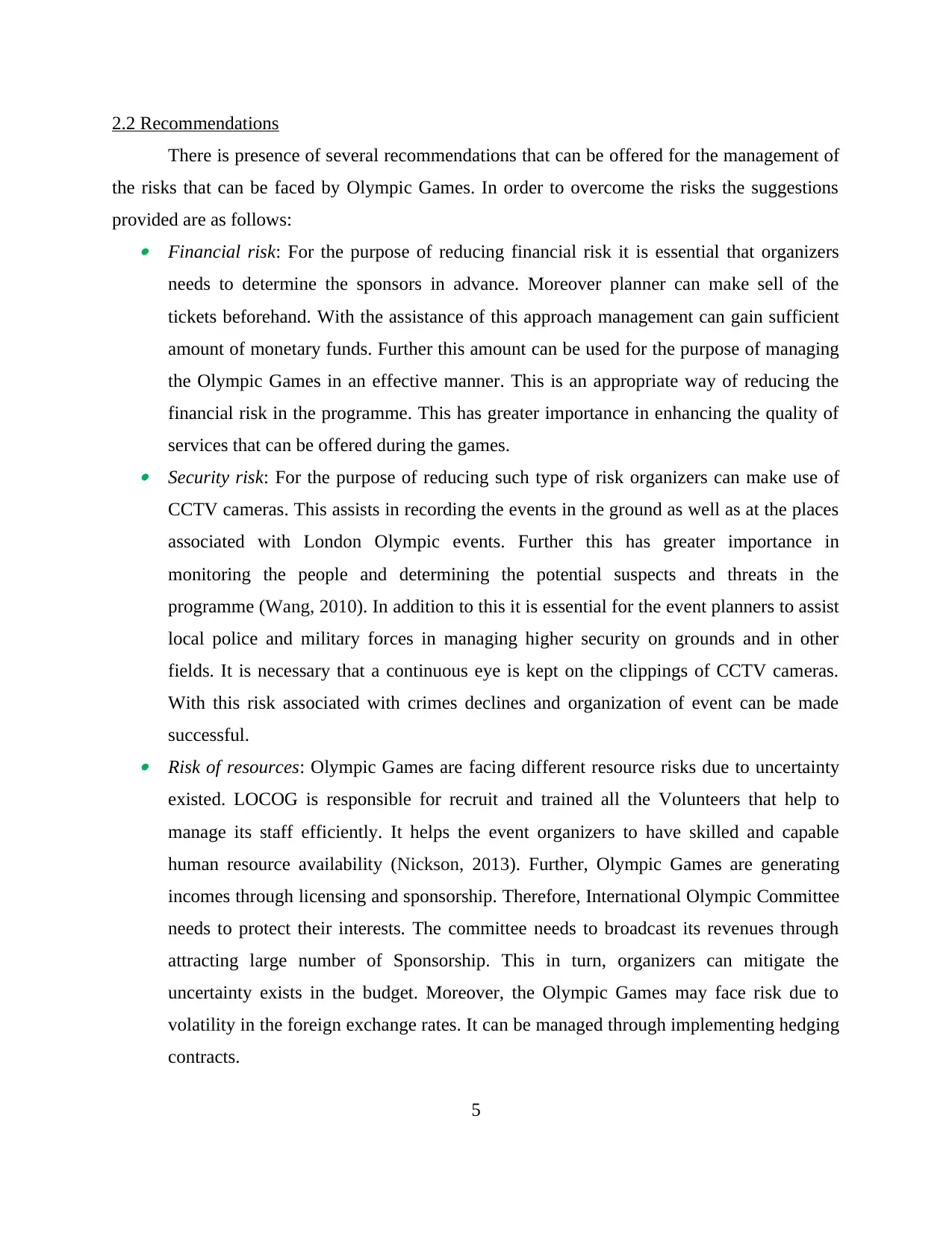
2.2 Recommendations
There is presence of several recommendations that can be offered for the management of
the risks that can be faced by Olympic Games. In order to overcome the risks the suggestions
provided are as follows: Financial risk: For the purpose of reducing financial risk it is essential that organizers
needs to determine the sponsors in advance. Moreover planner can make sell of the
tickets beforehand. With the assistance of this approach management can gain sufficient
amount of monetary funds. Further this amount can be used for the purpose of managing
the Olympic Games in an effective manner. This is an appropriate way of reducing the
financial risk in the programme. This has greater importance in enhancing the quality of
services that can be offered during the games. Security risk: For the purpose of reducing such type of risk organizers can make use of
CCTV cameras. This assists in recording the events in the ground as well as at the places
associated with London Olympic events. Further this has greater importance in
monitoring the people and determining the potential suspects and threats in the
programme (Wang, 2010). In addition to this it is essential for the event planners to assist
local police and military forces in managing higher security on grounds and in other
fields. It is necessary that a continuous eye is kept on the clippings of CCTV cameras.
With this risk associated with crimes declines and organization of event can be made
successful. Risk of resources: Olympic Games are facing different resource risks due to uncertainty
existed. LOCOG is responsible for recruit and trained all the Volunteers that help to
manage its staff efficiently. It helps the event organizers to have skilled and capable
human resource availability (Nickson, 2013). Further, Olympic Games are generating
incomes through licensing and sponsorship. Therefore, International Olympic Committee
needs to protect their interests. The committee needs to broadcast its revenues through
attracting large number of Sponsorship. This in turn, organizers can mitigate the
uncertainty exists in the budget. Moreover, the Olympic Games may face risk due to
volatility in the foreign exchange rates. It can be managed through implementing hedging
contracts.
5
There is presence of several recommendations that can be offered for the management of
the risks that can be faced by Olympic Games. In order to overcome the risks the suggestions
provided are as follows: Financial risk: For the purpose of reducing financial risk it is essential that organizers
needs to determine the sponsors in advance. Moreover planner can make sell of the
tickets beforehand. With the assistance of this approach management can gain sufficient
amount of monetary funds. Further this amount can be used for the purpose of managing
the Olympic Games in an effective manner. This is an appropriate way of reducing the
financial risk in the programme. This has greater importance in enhancing the quality of
services that can be offered during the games. Security risk: For the purpose of reducing such type of risk organizers can make use of
CCTV cameras. This assists in recording the events in the ground as well as at the places
associated with London Olympic events. Further this has greater importance in
monitoring the people and determining the potential suspects and threats in the
programme (Wang, 2010). In addition to this it is essential for the event planners to assist
local police and military forces in managing higher security on grounds and in other
fields. It is necessary that a continuous eye is kept on the clippings of CCTV cameras.
With this risk associated with crimes declines and organization of event can be made
successful. Risk of resources: Olympic Games are facing different resource risks due to uncertainty
existed. LOCOG is responsible for recruit and trained all the Volunteers that help to
manage its staff efficiently. It helps the event organizers to have skilled and capable
human resource availability (Nickson, 2013). Further, Olympic Games are generating
incomes through licensing and sponsorship. Therefore, International Olympic Committee
needs to protect their interests. The committee needs to broadcast its revenues through
attracting large number of Sponsorship. This in turn, organizers can mitigate the
uncertainty exists in the budget. Moreover, the Olympic Games may face risk due to
volatility in the foreign exchange rates. It can be managed through implementing hedging
contracts.
5
Paraphrase This Document
Need a fresh take? Get an instant paraphrase of this document with our AI Paraphraser
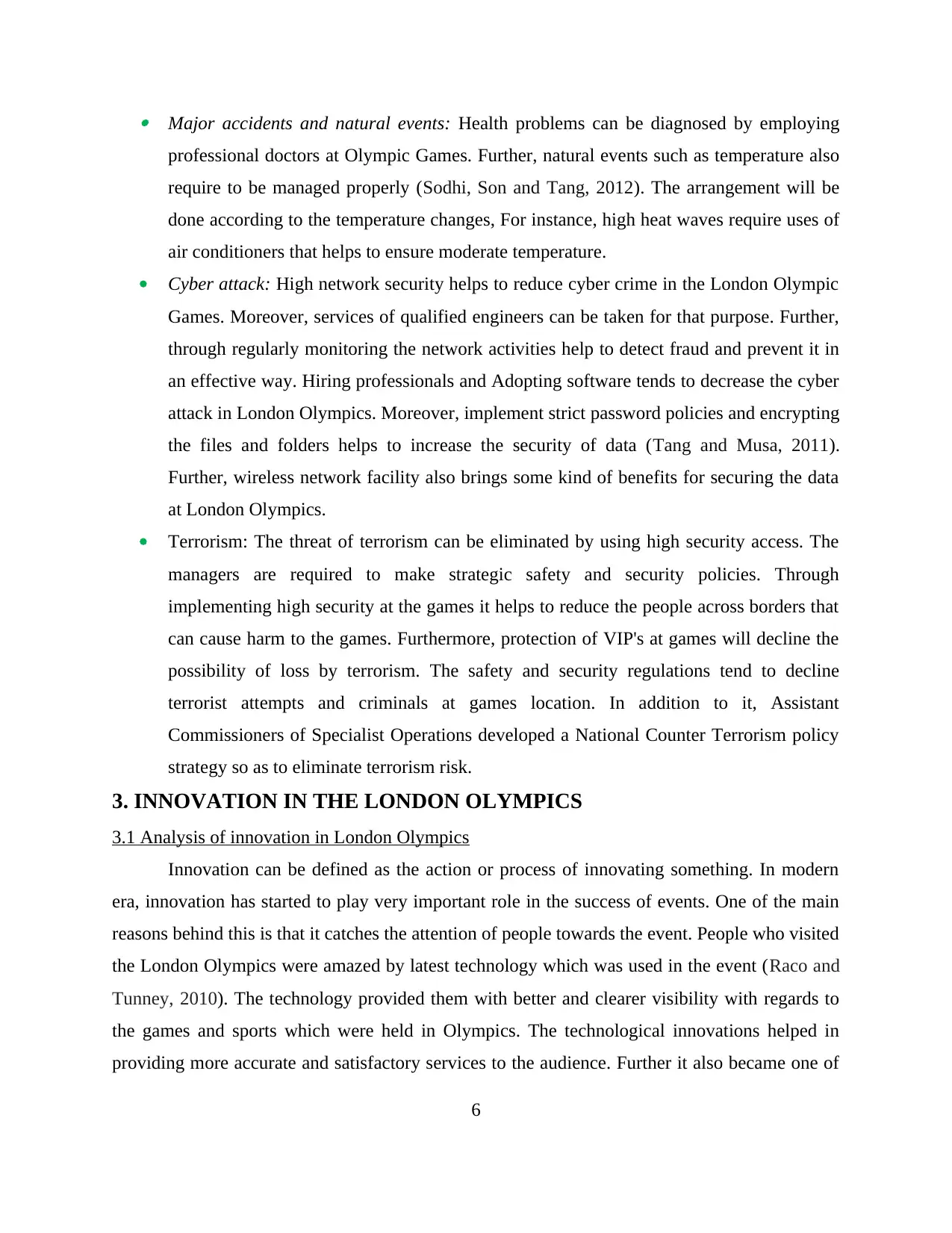
Major accidents and natural events: Health problems can be diagnosed by employing
professional doctors at Olympic Games. Further, natural events such as temperature also
require to be managed properly (Sodhi, Son and Tang, 2012). The arrangement will be
done according to the temperature changes, For instance, high heat waves require uses of
air conditioners that helps to ensure moderate temperature.
Cyber attack: High network security helps to reduce cyber crime in the London Olympic
Games. Moreover, services of qualified engineers can be taken for that purpose. Further,
through regularly monitoring the network activities help to detect fraud and prevent it in
an effective way. Hiring professionals and Adopting software tends to decrease the cyber
attack in London Olympics. Moreover, implement strict password policies and encrypting
the files and folders helps to increase the security of data (Tang and Musa, 2011).
Further, wireless network facility also brings some kind of benefits for securing the data
at London Olympics.
Terrorism: The threat of terrorism can be eliminated by using high security access. The
managers are required to make strategic safety and security policies. Through
implementing high security at the games it helps to reduce the people across borders that
can cause harm to the games. Furthermore, protection of VIP's at games will decline the
possibility of loss by terrorism. The safety and security regulations tend to decline
terrorist attempts and criminals at games location. In addition to it, Assistant
Commissioners of Specialist Operations developed a National Counter Terrorism policy
strategy so as to eliminate terrorism risk.
3. INNOVATION IN THE LONDON OLYMPICS
3.1 Analysis of innovation in London Olympics
Innovation can be defined as the action or process of innovating something. In modern
era, innovation has started to play very important role in the success of events. One of the main
reasons behind this is that it catches the attention of people towards the event. People who visited
the London Olympics were amazed by latest technology which was used in the event (Raco and
Tunney, 2010). The technology provided them with better and clearer visibility with regards to
the games and sports which were held in Olympics. The technological innovations helped in
providing more accurate and satisfactory services to the audience. Further it also became one of
6
professional doctors at Olympic Games. Further, natural events such as temperature also
require to be managed properly (Sodhi, Son and Tang, 2012). The arrangement will be
done according to the temperature changes, For instance, high heat waves require uses of
air conditioners that helps to ensure moderate temperature.
Cyber attack: High network security helps to reduce cyber crime in the London Olympic
Games. Moreover, services of qualified engineers can be taken for that purpose. Further,
through regularly monitoring the network activities help to detect fraud and prevent it in
an effective way. Hiring professionals and Adopting software tends to decrease the cyber
attack in London Olympics. Moreover, implement strict password policies and encrypting
the files and folders helps to increase the security of data (Tang and Musa, 2011).
Further, wireless network facility also brings some kind of benefits for securing the data
at London Olympics.
Terrorism: The threat of terrorism can be eliminated by using high security access. The
managers are required to make strategic safety and security policies. Through
implementing high security at the games it helps to reduce the people across borders that
can cause harm to the games. Furthermore, protection of VIP's at games will decline the
possibility of loss by terrorism. The safety and security regulations tend to decline
terrorist attempts and criminals at games location. In addition to it, Assistant
Commissioners of Specialist Operations developed a National Counter Terrorism policy
strategy so as to eliminate terrorism risk.
3. INNOVATION IN THE LONDON OLYMPICS
3.1 Analysis of innovation in London Olympics
Innovation can be defined as the action or process of innovating something. In modern
era, innovation has started to play very important role in the success of events. One of the main
reasons behind this is that it catches the attention of people towards the event. People who visited
the London Olympics were amazed by latest technology which was used in the event (Raco and
Tunney, 2010). The technology provided them with better and clearer visibility with regards to
the games and sports which were held in Olympics. The technological innovations helped in
providing more accurate and satisfactory services to the audience. Further it also became one of
6
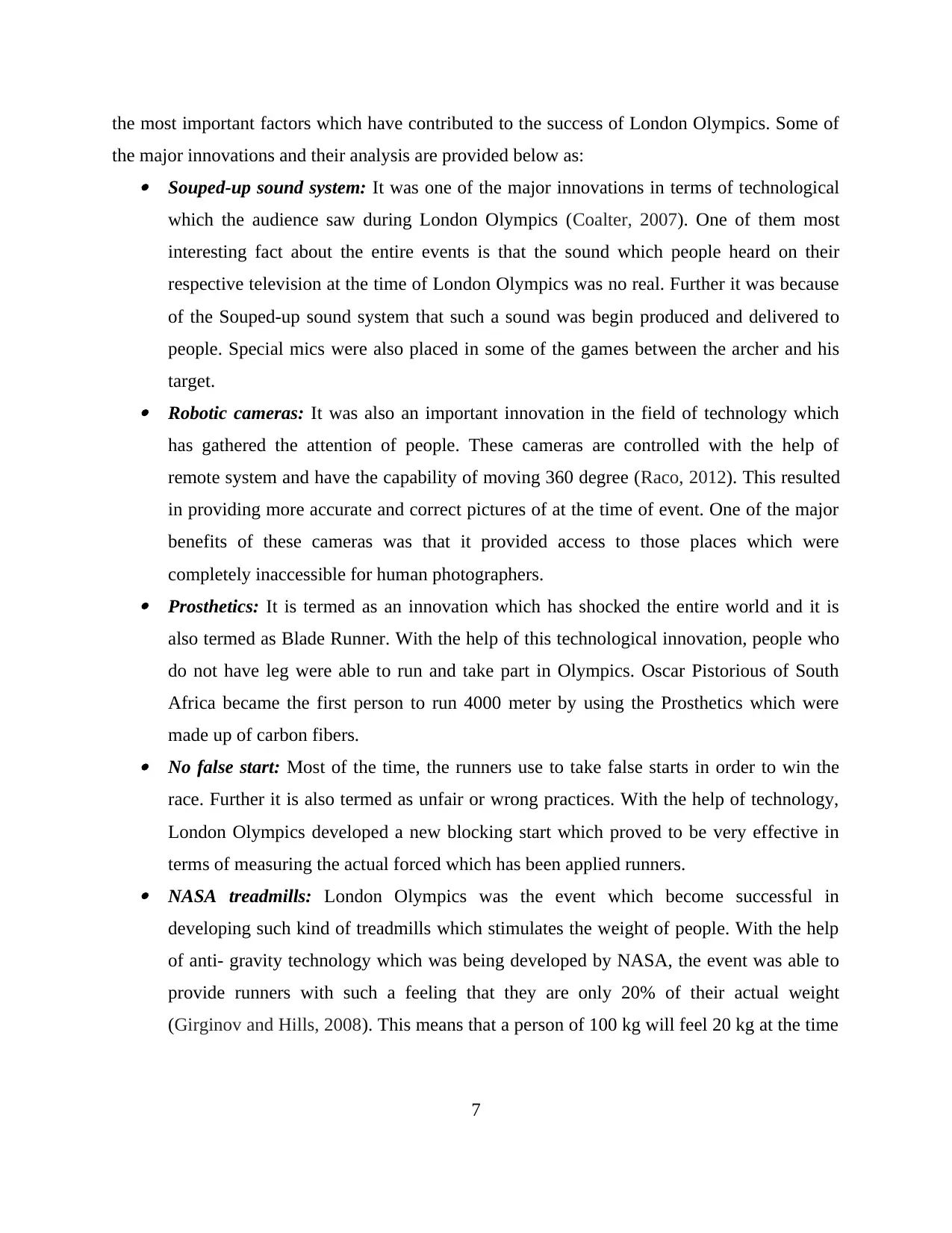
the most important factors which have contributed to the success of London Olympics. Some of
the major innovations and their analysis are provided below as: Souped-up sound system: It was one of the major innovations in terms of technological
which the audience saw during London Olympics (Coalter, 2007). One of them most
interesting fact about the entire events is that the sound which people heard on their
respective television at the time of London Olympics was no real. Further it was because
of the Souped-up sound system that such a sound was begin produced and delivered to
people. Special mics were also placed in some of the games between the archer and his
target. Robotic cameras: It was also an important innovation in the field of technology which
has gathered the attention of people. These cameras are controlled with the help of
remote system and have the capability of moving 360 degree (Raco, 2012). This resulted
in providing more accurate and correct pictures of at the time of event. One of the major
benefits of these cameras was that it provided access to those places which were
completely inaccessible for human photographers. Prosthetics: It is termed as an innovation which has shocked the entire world and it is
also termed as Blade Runner. With the help of this technological innovation, people who
do not have leg were able to run and take part in Olympics. Oscar Pistorious of South
Africa became the first person to run 4000 meter by using the Prosthetics which were
made up of carbon fibers. No false start: Most of the time, the runners use to take false starts in order to win the
race. Further it is also termed as unfair or wrong practices. With the help of technology,
London Olympics developed a new blocking start which proved to be very effective in
terms of measuring the actual forced which has been applied runners. NASA treadmills: London Olympics was the event which become successful in
developing such kind of treadmills which stimulates the weight of people. With the help
of anti- gravity technology which was being developed by NASA, the event was able to
provide runners with such a feeling that they are only 20% of their actual weight
(Girginov and Hills, 2008). This means that a person of 100 kg will feel 20 kg at the time
7
the major innovations and their analysis are provided below as: Souped-up sound system: It was one of the major innovations in terms of technological
which the audience saw during London Olympics (Coalter, 2007). One of them most
interesting fact about the entire events is that the sound which people heard on their
respective television at the time of London Olympics was no real. Further it was because
of the Souped-up sound system that such a sound was begin produced and delivered to
people. Special mics were also placed in some of the games between the archer and his
target. Robotic cameras: It was also an important innovation in the field of technology which
has gathered the attention of people. These cameras are controlled with the help of
remote system and have the capability of moving 360 degree (Raco, 2012). This resulted
in providing more accurate and correct pictures of at the time of event. One of the major
benefits of these cameras was that it provided access to those places which were
completely inaccessible for human photographers. Prosthetics: It is termed as an innovation which has shocked the entire world and it is
also termed as Blade Runner. With the help of this technological innovation, people who
do not have leg were able to run and take part in Olympics. Oscar Pistorious of South
Africa became the first person to run 4000 meter by using the Prosthetics which were
made up of carbon fibers. No false start: Most of the time, the runners use to take false starts in order to win the
race. Further it is also termed as unfair or wrong practices. With the help of technology,
London Olympics developed a new blocking start which proved to be very effective in
terms of measuring the actual forced which has been applied runners. NASA treadmills: London Olympics was the event which become successful in
developing such kind of treadmills which stimulates the weight of people. With the help
of anti- gravity technology which was being developed by NASA, the event was able to
provide runners with such a feeling that they are only 20% of their actual weight
(Girginov and Hills, 2008). This means that a person of 100 kg will feel 20 kg at the time
7
⊘ This is a preview!⊘
Do you want full access?
Subscribe today to unlock all pages.

Trusted by 1+ million students worldwide
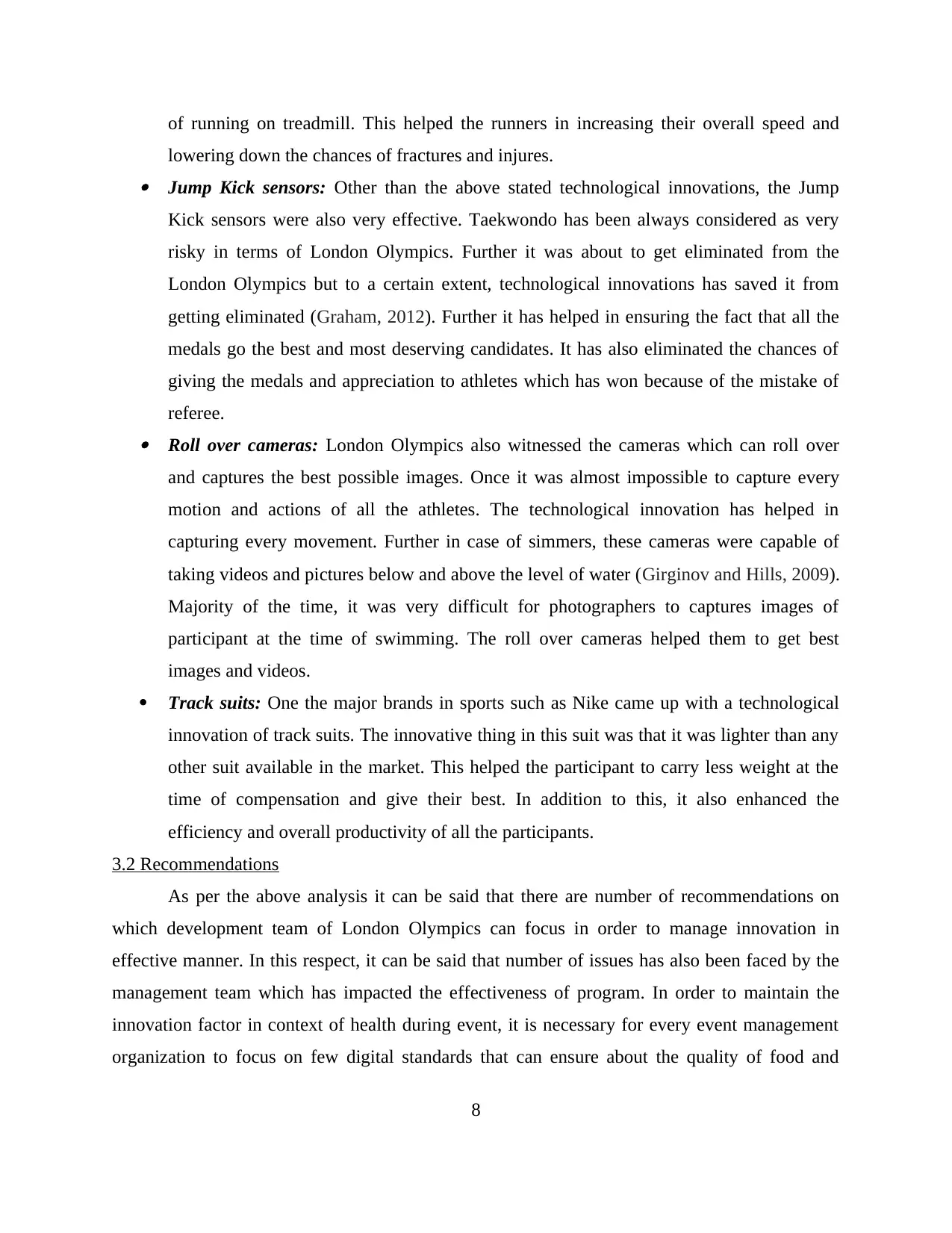
of running on treadmill. This helped the runners in increasing their overall speed and
lowering down the chances of fractures and injures. Jump Kick sensors: Other than the above stated technological innovations, the Jump
Kick sensors were also very effective. Taekwondo has been always considered as very
risky in terms of London Olympics. Further it was about to get eliminated from the
London Olympics but to a certain extent, technological innovations has saved it from
getting eliminated (Graham, 2012). Further it has helped in ensuring the fact that all the
medals go the best and most deserving candidates. It has also eliminated the chances of
giving the medals and appreciation to athletes which has won because of the mistake of
referee. Roll over cameras: London Olympics also witnessed the cameras which can roll over
and captures the best possible images. Once it was almost impossible to capture every
motion and actions of all the athletes. The technological innovation has helped in
capturing every movement. Further in case of simmers, these cameras were capable of
taking videos and pictures below and above the level of water (Girginov and Hills, 2009).
Majority of the time, it was very difficult for photographers to captures images of
participant at the time of swimming. The roll over cameras helped them to get best
images and videos.
Track suits: One the major brands in sports such as Nike came up with a technological
innovation of track suits. The innovative thing in this suit was that it was lighter than any
other suit available in the market. This helped the participant to carry less weight at the
time of compensation and give their best. In addition to this, it also enhanced the
efficiency and overall productivity of all the participants.
3.2 Recommendations
As per the above analysis it can be said that there are number of recommendations on
which development team of London Olympics can focus in order to manage innovation in
effective manner. In this respect, it can be said that number of issues has also been faced by the
management team which has impacted the effectiveness of program. In order to maintain the
innovation factor in context of health during event, it is necessary for every event management
organization to focus on few digital standards that can ensure about the quality of food and
8
lowering down the chances of fractures and injures. Jump Kick sensors: Other than the above stated technological innovations, the Jump
Kick sensors were also very effective. Taekwondo has been always considered as very
risky in terms of London Olympics. Further it was about to get eliminated from the
London Olympics but to a certain extent, technological innovations has saved it from
getting eliminated (Graham, 2012). Further it has helped in ensuring the fact that all the
medals go the best and most deserving candidates. It has also eliminated the chances of
giving the medals and appreciation to athletes which has won because of the mistake of
referee. Roll over cameras: London Olympics also witnessed the cameras which can roll over
and captures the best possible images. Once it was almost impossible to capture every
motion and actions of all the athletes. The technological innovation has helped in
capturing every movement. Further in case of simmers, these cameras were capable of
taking videos and pictures below and above the level of water (Girginov and Hills, 2009).
Majority of the time, it was very difficult for photographers to captures images of
participant at the time of swimming. The roll over cameras helped them to get best
images and videos.
Track suits: One the major brands in sports such as Nike came up with a technological
innovation of track suits. The innovative thing in this suit was that it was lighter than any
other suit available in the market. This helped the participant to carry less weight at the
time of compensation and give their best. In addition to this, it also enhanced the
efficiency and overall productivity of all the participants.
3.2 Recommendations
As per the above analysis it can be said that there are number of recommendations on
which development team of London Olympics can focus in order to manage innovation in
effective manner. In this respect, it can be said that number of issues has also been faced by the
management team which has impacted the effectiveness of program. In order to maintain the
innovation factor in context of health during event, it is necessary for every event management
organization to focus on few digital standards that can ensure about the quality of food and
8
Paraphrase This Document
Need a fresh take? Get an instant paraphrase of this document with our AI Paraphraser
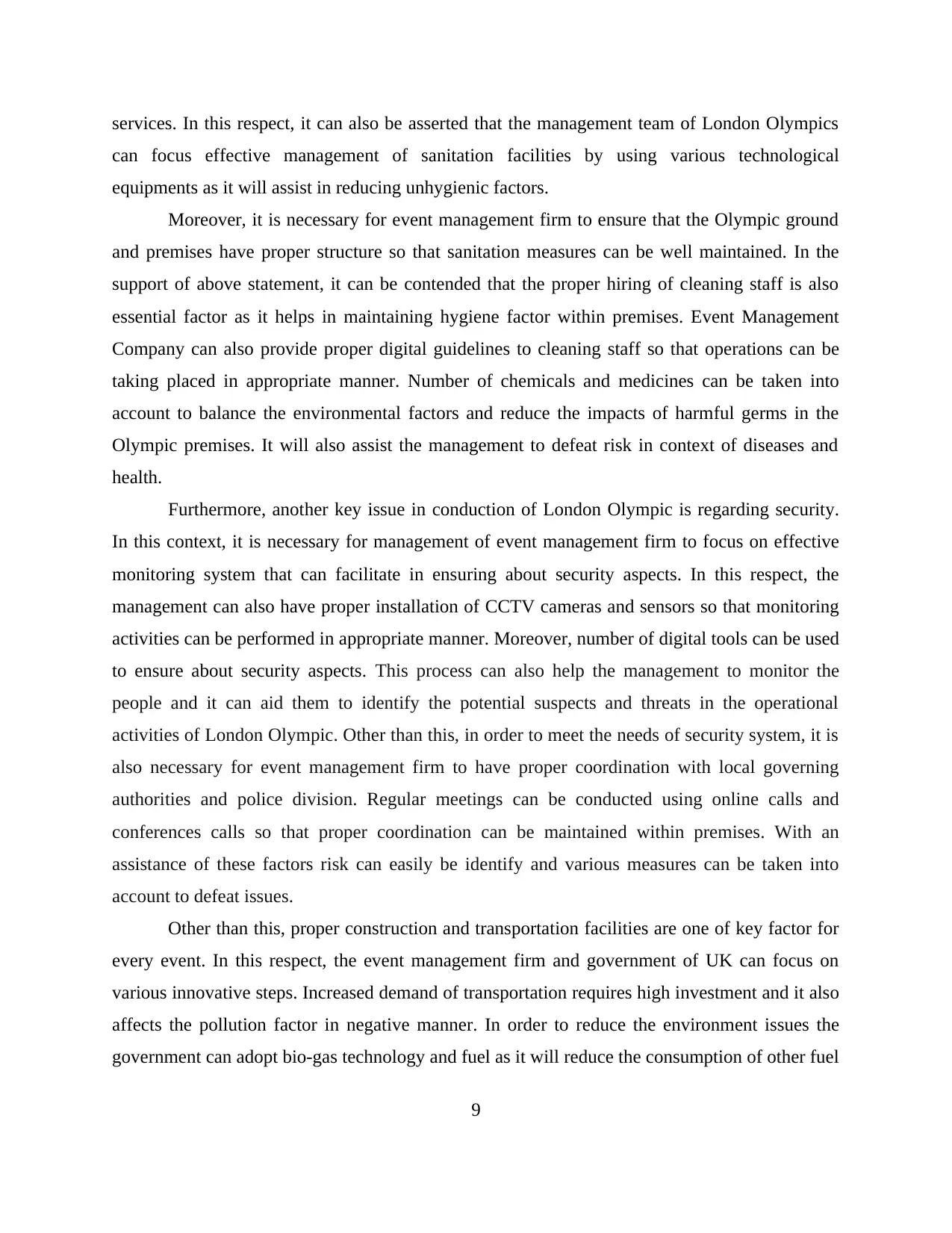
services. In this respect, it can also be asserted that the management team of London Olympics
can focus effective management of sanitation facilities by using various technological
equipments as it will assist in reducing unhygienic factors.
Moreover, it is necessary for event management firm to ensure that the Olympic ground
and premises have proper structure so that sanitation measures can be well maintained. In the
support of above statement, it can be contended that the proper hiring of cleaning staff is also
essential factor as it helps in maintaining hygiene factor within premises. Event Management
Company can also provide proper digital guidelines to cleaning staff so that operations can be
taking placed in appropriate manner. Number of chemicals and medicines can be taken into
account to balance the environmental factors and reduce the impacts of harmful germs in the
Olympic premises. It will also assist the management to defeat risk in context of diseases and
health.
Furthermore, another key issue in conduction of London Olympic is regarding security.
In this context, it is necessary for management of event management firm to focus on effective
monitoring system that can facilitate in ensuring about security aspects. In this respect, the
management can also have proper installation of CCTV cameras and sensors so that monitoring
activities can be performed in appropriate manner. Moreover, number of digital tools can be used
to ensure about security aspects. This process can also help the management to monitor the
people and it can aid them to identify the potential suspects and threats in the operational
activities of London Olympic. Other than this, in order to meet the needs of security system, it is
also necessary for event management firm to have proper coordination with local governing
authorities and police division. Regular meetings can be conducted using online calls and
conferences calls so that proper coordination can be maintained within premises. With an
assistance of these factors risk can easily be identify and various measures can be taken into
account to defeat issues.
Other than this, proper construction and transportation facilities are one of key factor for
every event. In this respect, the event management firm and government of UK can focus on
various innovative steps. Increased demand of transportation requires high investment and it also
affects the pollution factor in negative manner. In order to reduce the environment issues the
government can adopt bio-gas technology and fuel as it will reduce the consumption of other fuel
9
can focus effective management of sanitation facilities by using various technological
equipments as it will assist in reducing unhygienic factors.
Moreover, it is necessary for event management firm to ensure that the Olympic ground
and premises have proper structure so that sanitation measures can be well maintained. In the
support of above statement, it can be contended that the proper hiring of cleaning staff is also
essential factor as it helps in maintaining hygiene factor within premises. Event Management
Company can also provide proper digital guidelines to cleaning staff so that operations can be
taking placed in appropriate manner. Number of chemicals and medicines can be taken into
account to balance the environmental factors and reduce the impacts of harmful germs in the
Olympic premises. It will also assist the management to defeat risk in context of diseases and
health.
Furthermore, another key issue in conduction of London Olympic is regarding security.
In this context, it is necessary for management of event management firm to focus on effective
monitoring system that can facilitate in ensuring about security aspects. In this respect, the
management can also have proper installation of CCTV cameras and sensors so that monitoring
activities can be performed in appropriate manner. Moreover, number of digital tools can be used
to ensure about security aspects. This process can also help the management to monitor the
people and it can aid them to identify the potential suspects and threats in the operational
activities of London Olympic. Other than this, in order to meet the needs of security system, it is
also necessary for event management firm to have proper coordination with local governing
authorities and police division. Regular meetings can be conducted using online calls and
conferences calls so that proper coordination can be maintained within premises. With an
assistance of these factors risk can easily be identify and various measures can be taken into
account to defeat issues.
Other than this, proper construction and transportation facilities are one of key factor for
every event. In this respect, the event management firm and government of UK can focus on
various innovative steps. Increased demand of transportation requires high investment and it also
affects the pollution factor in negative manner. In order to reduce the environment issues the
government can adopt bio-gas technology and fuel as it will reduce the consumption of other fuel
9
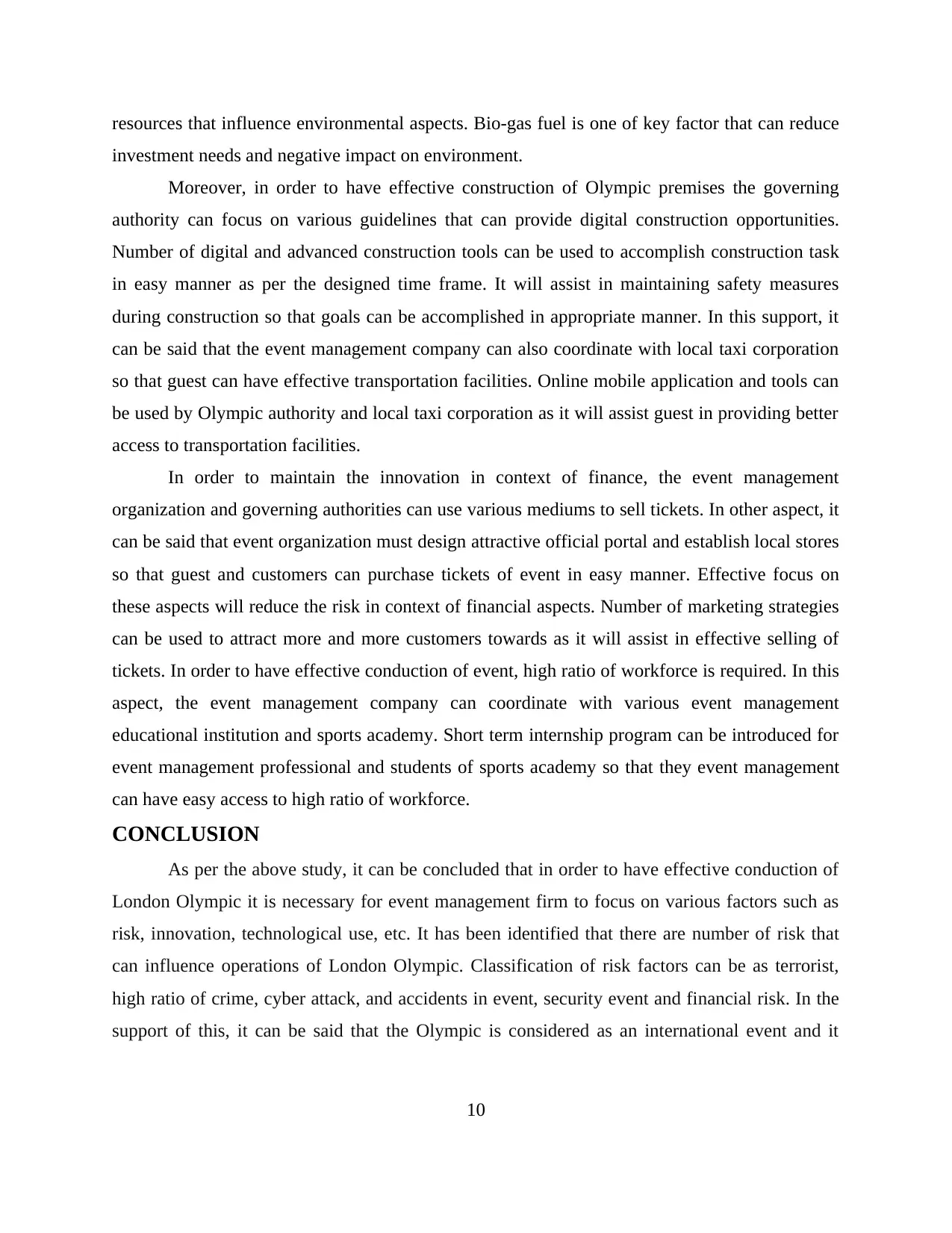
resources that influence environmental aspects. Bio-gas fuel is one of key factor that can reduce
investment needs and negative impact on environment.
Moreover, in order to have effective construction of Olympic premises the governing
authority can focus on various guidelines that can provide digital construction opportunities.
Number of digital and advanced construction tools can be used to accomplish construction task
in easy manner as per the designed time frame. It will assist in maintaining safety measures
during construction so that goals can be accomplished in appropriate manner. In this support, it
can be said that the event management company can also coordinate with local taxi corporation
so that guest can have effective transportation facilities. Online mobile application and tools can
be used by Olympic authority and local taxi corporation as it will assist guest in providing better
access to transportation facilities.
In order to maintain the innovation in context of finance, the event management
organization and governing authorities can use various mediums to sell tickets. In other aspect, it
can be said that event organization must design attractive official portal and establish local stores
so that guest and customers can purchase tickets of event in easy manner. Effective focus on
these aspects will reduce the risk in context of financial aspects. Number of marketing strategies
can be used to attract more and more customers towards as it will assist in effective selling of
tickets. In order to have effective conduction of event, high ratio of workforce is required. In this
aspect, the event management company can coordinate with various event management
educational institution and sports academy. Short term internship program can be introduced for
event management professional and students of sports academy so that they event management
can have easy access to high ratio of workforce.
CONCLUSION
As per the above study, it can be concluded that in order to have effective conduction of
London Olympic it is necessary for event management firm to focus on various factors such as
risk, innovation, technological use, etc. It has been identified that there are number of risk that
can influence operations of London Olympic. Classification of risk factors can be as terrorist,
high ratio of crime, cyber attack, and accidents in event, security event and financial risk. In the
support of this, it can be said that the Olympic is considered as an international event and it
10
investment needs and negative impact on environment.
Moreover, in order to have effective construction of Olympic premises the governing
authority can focus on various guidelines that can provide digital construction opportunities.
Number of digital and advanced construction tools can be used to accomplish construction task
in easy manner as per the designed time frame. It will assist in maintaining safety measures
during construction so that goals can be accomplished in appropriate manner. In this support, it
can be said that the event management company can also coordinate with local taxi corporation
so that guest can have effective transportation facilities. Online mobile application and tools can
be used by Olympic authority and local taxi corporation as it will assist guest in providing better
access to transportation facilities.
In order to maintain the innovation in context of finance, the event management
organization and governing authorities can use various mediums to sell tickets. In other aspect, it
can be said that event organization must design attractive official portal and establish local stores
so that guest and customers can purchase tickets of event in easy manner. Effective focus on
these aspects will reduce the risk in context of financial aspects. Number of marketing strategies
can be used to attract more and more customers towards as it will assist in effective selling of
tickets. In order to have effective conduction of event, high ratio of workforce is required. In this
aspect, the event management company can coordinate with various event management
educational institution and sports academy. Short term internship program can be introduced for
event management professional and students of sports academy so that they event management
can have easy access to high ratio of workforce.
CONCLUSION
As per the above study, it can be concluded that in order to have effective conduction of
London Olympic it is necessary for event management firm to focus on various factors such as
risk, innovation, technological use, etc. It has been identified that there are number of risk that
can influence operations of London Olympic. Classification of risk factors can be as terrorist,
high ratio of crime, cyber attack, and accidents in event, security event and financial risk. In the
support of this, it can be said that the Olympic is considered as an international event and it
10
⊘ This is a preview!⊘
Do you want full access?
Subscribe today to unlock all pages.

Trusted by 1+ million students worldwide
1 out of 15
Related Documents
Your All-in-One AI-Powered Toolkit for Academic Success.
+13062052269
info@desklib.com
Available 24*7 on WhatsApp / Email
![[object Object]](/_next/static/media/star-bottom.7253800d.svg)
Unlock your academic potential
Copyright © 2020–2026 A2Z Services. All Rights Reserved. Developed and managed by ZUCOL.





